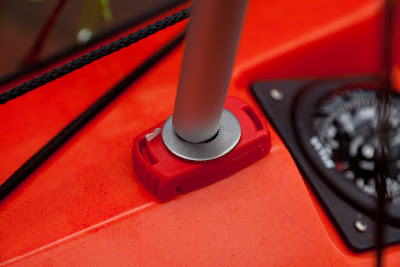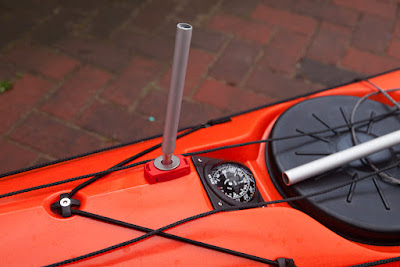I have been lucky enough to secure a long term loan of a P&H Delphin in order to carry out a long term test and review. The Delphin is P&H's "play the sea" kayak. I have four other sea kayaks in my garage, so I don't really need the Delphin, but straight away I liked the long cockpit. I have increasing difficulty getting in and out of the Nordkapp LV because of my bad knees. The Delphin's extra couple of inches in the cockpit length make all the difference!
There is no day hatch behind the cockpit, a large rear oval hatch gives access to a surprisingly commodious rear compartment. The lack of day hatch probably maximises use of space, because the Delphin takes the same weekend camping gear that my Nordkapp LV holds!
It is a very distinctive looking kayak. Ignore the sail for just now, just look at all that rocker...
..then look at the bow. Its volume and inverted V on the deck are designed to resist pearling and for resurfacing.
Even more interesting is the shape under the bow, hard chines and a midline V are joined by double concaves (usually seen on sea plane floats and windsurfers to generate lift). The hard edges wash out to rounded hull in the cockpit area going into softer chines towards the stern. At this point I should say that I have never seen such high quality moulding and definition on a roto moulded polyethylene kayak... it was faultless.
The small deck pod holds a VHF radio and a grain bar but not much else, it won't take a full size rocket flare. The fore hatch is round but as it is quite high off the bottom of the hull. My Nallo 3GT tent fitted in with the poles still rolled inside the tent.
The back rest is well secured to keep it out the way during re-entries and decent hip pads are fitted.
They can move up and down, being held in place by velcro backing and the top moves inwards as...
...the seat back straps are tightened by the river kayak style ratchets. By loosening these off you can have a nice comfy fit for touring then tighten them up for a secure fit in buttock clenching tide races. In addition to padding on the inside of the thigh grip there is further foam padding stuck on the inside of the hull for the knees. The right one came off the first time the kayak got wet.
Behind the left thigh grip you can see the inside of the moulding that holds the ratchet skeg slider. It is a development of the previous P&H cable skeg, which I had unsatisfactory experiences with on two Cetuses and a Cetus LV. The action on this one is incredibly light. The cord now runs in larger diameter tubing and so far it has worked faultlessly. My only gripe was that as supplied, the knot in the adjustment cord had been tied too short and this only allowed the slider to move in the back third of the ratchet track and the skeg only came down to 25 degrees. This was not enough to prevent weather cocking with a force 4 wind on the rear quarter. It was easy enough to untie the knot and make the cord longer, to use the whole track. The skeg now comes down to about 75 degrees and this fixed the weather cocking.
The deck pod intrudes quite a lot into the cockpit, which is good as it reduces free cockpit volume in a wet rescue but if you have short legs like me (29" inside leg) your feet don't extend beyond the pod so they are restricted and you can't stretch your legs out together in the mid-line. The plastic foot rest peddles are a good size and can be adjusted on the water by twisting the red locking knob then using your toe to push or pull the peddles along the track. A previous version of these peddles had a green adjustment knob that could be used to push or pull the peddles as well as lock them. Some people found the green version could give way. This new version is rock solid.
A security brace can also be used to mount a deck mounted tow rope. I use a Plastimo quick release snap shackle so you don't need a separate cleat.
So what's it like on the water? These notes are based on just 2 outings on the Clyde and one on the Solway. I will do a long term review next year. My first impression was of rock solid primary stability at rest though I know two beginners who trialled a Delphin alongside a Scorpio. They both found the Delphin unstable in comparison and each bought a Scorpio.
You would expect a "playboat of the sea" to roll well. It does, the low back deck aids back deck rolls. It is also exceptionally easy to do a re-entry roll, the hip pads and thigh grips make it easy to keep your bum in the seat. Some wet work showed that the forward day hatch is not waterproof (unlike those on the composite P&H kayaks). My friends with the Scorpios were also practising rolling and rescues. They had the same problem with the forward day hatch leaking, despite having drilled out the 6 pop rivets and resealed the pod. It also leaks through the hole for the hatch cover securing cord...
...as do the main front and rear hatches. The large hole through the foam bulkhead let in a surprising amount of water during practice self rescues. This would be easily enough to seal if you wanted to use the Delphin on a weekend trip with touring gear aboard.
Edged over the Delphin hits a very secure wall of secondary stability and my goodness, how this kayak turns on edge!
I am paddling on both sides and only steering by edging...
...yet the stern just slid...
...round behind me...
...and I was back the way I came. It goes round even faster using a bow rudder.
Some beginners have also complained that the Delphin is difficult to paddle in a straight line because the kayak is so manoeuvrable (and as you can see here the rocker definitely contributes to the easy turning). However, it responds very well to the skeg which allows straight tracking in a variety of wind conditions.
The water in Ayr Bay was like a millpond...
...so we decided to head out to the Heads of Ayr and rock hop round the point...
...where the spring ebb tide was running out against a 14 knot SW wind and a little swell.
The Delphin handled the bumpy water with ease and once round the headland, I bore off into...
...Bracken Bay. I left Phil in my wake, as I caught the small waves and surfed to the shore. I have never been in a sea kayak that has caught waves so easily, it even outperforms my Alaw Bach in this department! My GPS log showed I was hitting 14 km/hr surfing on the waves.
I paddled the Delphin alongside Phil's P&H Quest. On flat water in Ayr Bay, the maximum sprint speed of the Delphin was about 4km/hr less than the Quest. However,...
...returning from off the Heads of Ayr, with the wind and waves behind us, the Delphin was catching many more waves than the Quest and streaked ahead. Note than when paddling purposefully the full length of the stern engages in the water, increasing speed.
Fun though paddling the Delphin was, with those water shedding rails up front, I could't wait until I fitted a sail...
...and then it shot off downwind, averaging 11km/hr and shooting up to 15.8km/hr, surfing through the waves in front.
Within minutes, Phil was left as a dot on the horizon. So I let him catch up and pass me...
...before catching a small wave...
...and blasting past him again!
I have only been out three times in the Delphin but I have already been persuaded that this is probably the most versatile kayak I have ever paddled. Yes, it clearly excels at "Play the Sea" but it is capable of much more than that. It keeps up with conventional kayaks at normal cruising speed, it will take you a weekend camping trip and I also think it would be ideal for beginners.
I can't wait to take it out to some of our fun local tide races such as the...
...Grey Dogs or...
...the Mull of Galloway!
All of our team are literally gagging to try the Delphin. Well, they are going to have to gang up on me!
On water photos of Delphin by Philip Toman
Added 17/10/2011
Paddling into a force 4-5 wind, the Delphin can keep up with the Quest and the Cetus. In this sort of wind the Delphin literally flies with a sail. I was regularly hitting 18km/hr sailing and surfing down the waves.









































































